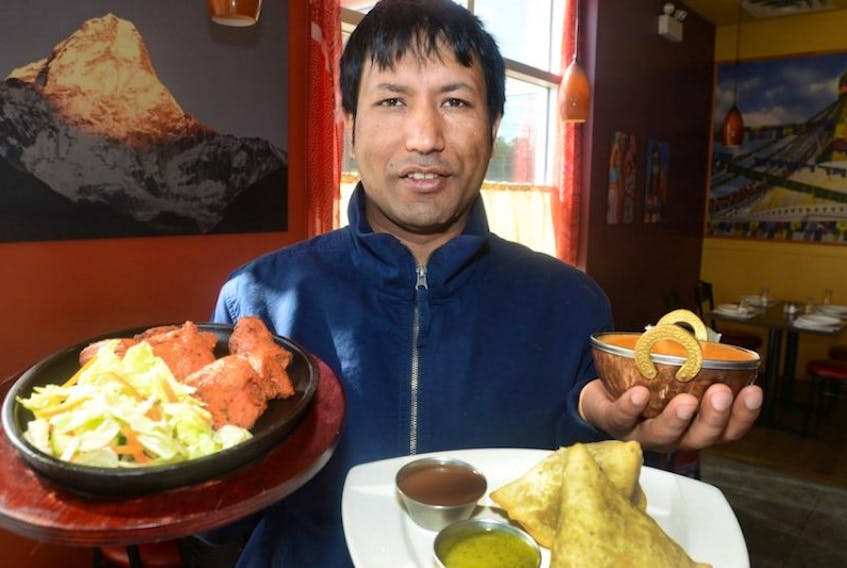Entrepreneurs wishing to open new businesses in Prince Edward Island face layers of government bureaucracy before they can hang the “open” sign.
Those challenges are particularly acute for immigrants who might still be learning English and who have had reason to distrust government officials in their countries of origin.
And the barriers are costing taxpayers money, says Anuj Thapa, who recently opened his Himalayan Curry restaurant in the Midtown Plaza in Charlottetown.
He says he’s been waiting since he opened — eight months — for a liquor licence and, meanwhile, “a working man is losing money, the government is losing money and they have so lengthy a process.”
Thapa’s case is particularly complicated because he discovered his establishment is located in an area of the city that had been zoned under a bylaw that prohibits alcohol being sold within 100 metres of a church, school or daycare.
He spent months urging city hall to change the bylaw wording to differentiate between family restaurants and bars and pubs. That change finally happened at a recent city council meeting.
“They are changing it because I am pushing it,” said Thapa. “That is really not understandable.”
While not every restaurant owner has to go through getting bylaws changed, other newcomers have also told The Guardian obtaining a liquor licence is particularly fraught with obstacles. Above and beyond the paperwork that has to be filed with the Liquor Control Commission, the provincial Health Department and the municipal fire department also have to sign off on inspections.
“A liquor licence is practically automatic in Germany,” said Axel Leonhard, whose Leonhard’s Cafe and Restaurant is now licensed to sell alcoholic beverages.
The drinking age in Germany is 16 and, Leonhard said, “If kids want to get (alcohol), they can get it. Same as here. The problem is not worse, so that is why I say I can’t understand (the lengthy procedure).”
Thapa proposes Prince Edward Island set up a “one-window service” where an entrepreneur — whether an immigrant or not — can go and find out all of the steps for opening a business in the province. The way it works now, he says, a new business owner has no idea where to go, what the next step is, what government department to visit or even who to ask.
“I can search and I can Google,” he said. “I can call Innovation and ask people a hundred questions and call the city and ask a hundred questions but some people cannot” either because their English or business acumen is not polished or because they dread dealing with government officials.
Shane MacDougall, director for business development and integration with Innovation P.E.I., says there are a lot of places a prospective business owner can go to get the information he or she needs, but he says there is just no way to offer the one-window service Thapa is looking for.
“Where possible, we try to bundle services as best we can,” MacDougall said. “But ultimately certain jurisdictions control their own permits.”
MacDougall pointed out countless places that offer help, including Access P.E.I. sites, Rural Action Centres, business development offices and even banks and chambers of commerce. BizPal, for example, is a new online service that
provides access to information about business permits, licences and other requirements needed to establish, operate and grow businesses.
“Is there one person who knows everything? Probably not,” said MacDougall. “But for the most part they can find somebody who will point them in the right direction for everything they need.”
Another recent venture addressing this problem is the P.E.I. Connectors program, which is funded by the federal and provincial governments and operates under the umbrella of the Greater Charlottetown Chamber of Commerce.
Jason Lee, who is the program co-ordinator at P.E.I. Connectors, believes information has become easier to access since his program began operating in June 2011.
“That’s why we’re here,” he said. “Because it was recognized prior to that point that there’s an opportunity here. There’s well educated and well financed people wanting to come and open a business here and it’s hard.”
He noted the Greater Charlottetown Chamber of Commerce helped identify that need and has been working with municipalities across P.E.I., as well as the provincial and federal governments, to make business information more readily available.
He pointed out as well as the chamber, the Canada Business Network, ACOA and CBDC have all renewed efforts to ease the situation for new entrepreneurs — regardless of whether they were born in Canada or not.
But Thapa, who arrived in P.E.I. in July 2013, says he’s had friends in Toronto ask him about coming east and he doesn’t feel comfortable recommending the province as a place to do business.
“There’s nothing that says I should go to P.E.I.,” said Thapa.
“With all this hassle I might think, why not Halifax? Why not Moncton? Every business will not like this. So I think the bureaucrats and the government should attract the business people a new way.
“I think the government should attract, not distract.”
Leonhard said, while he has found some aspects of setting up a business in P.E.I. to be unnecessarily convoluted, he doesn’t think that’s unique to Island bureaucracy, noting that getting renovations done to his business and to his home was hassle-free and cheaper than it would have been in Germany.
“You end up spending the same amount of money and the same time — it’s just on different things.”
Entrepreneurs wishing to open new businesses in Prince Edward Island face layers of government bureaucracy before they can hang the “open” sign.
Those challenges are particularly acute for immigrants who might still be learning English and who have had reason to distrust government officials in their countries of origin.
And the barriers are costing taxpayers money, says Anuj Thapa, who recently opened his Himalayan Curry restaurant in the Midtown Plaza in Charlottetown.
He says he’s been waiting since he opened — eight months — for a liquor licence and, meanwhile, “a working man is losing money, the government is losing money and they have so lengthy a process.”
Thapa’s case is particularly complicated because he discovered his establishment is located in an area of the city that had been zoned under a bylaw that prohibits alcohol being sold within 100 metres of a church, school or daycare.
He spent months urging city hall to change the bylaw wording to differentiate between family restaurants and bars and pubs. That change finally happened at a recent city council meeting.
“They are changing it because I am pushing it,” said Thapa. “That is really not understandable.”
While not every restaurant owner has to go through getting bylaws changed, other newcomers have also told The Guardian obtaining a liquor licence is particularly fraught with obstacles. Above and beyond the paperwork that has to be filed with the Liquor Control Commission, the provincial Health Department and the municipal fire department also have to sign off on inspections.
“A liquor licence is practically automatic in Germany,” said Axel Leonhard, whose Leonhard’s Cafe and Restaurant is now licensed to sell alcoholic beverages.
The drinking age in Germany is 16 and, Leonhard said, “If kids want to get (alcohol), they can get it. Same as here. The problem is not worse, so that is why I say I can’t understand (the lengthy procedure).”
Thapa proposes Prince Edward Island set up a “one-window service” where an entrepreneur — whether an immigrant or not — can go and find out all of the steps for opening a business in the province. The way it works now, he says, a new business owner has no idea where to go, what the next step is, what government department to visit or even who to ask.
“I can search and I can Google,” he said. “I can call Innovation and ask people a hundred questions and call the city and ask a hundred questions but some people cannot” either because their English or business acumen is not polished or because they dread dealing with government officials.
Shane MacDougall, director for business development and integration with Innovation P.E.I., says there are a lot of places a prospective business owner can go to get the information he or she needs, but he says there is just no way to offer the one-window service Thapa is looking for.
“Where possible, we try to bundle services as best we can,” MacDougall said. “But ultimately certain jurisdictions control their own permits.”
MacDougall pointed out countless places that offer help, including Access P.E.I. sites, Rural Action Centres, business development offices and even banks and chambers of commerce. BizPal, for example, is a new online service that
provides access to information about business permits, licences and other requirements needed to establish, operate and grow businesses.
“Is there one person who knows everything? Probably not,” said MacDougall. “But for the most part they can find somebody who will point them in the right direction for everything they need.”
Another recent venture addressing this problem is the P.E.I. Connectors program, which is funded by the federal and provincial governments and operates under the umbrella of the Greater Charlottetown Chamber of Commerce.
Jason Lee, who is the program co-ordinator at P.E.I. Connectors, believes information has become easier to access since his program began operating in June 2011.
“That’s why we’re here,” he said. “Because it was recognized prior to that point that there’s an opportunity here. There’s well educated and well financed people wanting to come and open a business here and it’s hard.”
He noted the Greater Charlottetown Chamber of Commerce helped identify that need and has been working with municipalities across P.E.I., as well as the provincial and federal governments, to make business information more readily available.
He pointed out as well as the chamber, the Canada Business Network, ACOA and CBDC have all renewed efforts to ease the situation for new entrepreneurs — regardless of whether they were born in Canada or not.
But Thapa, who arrived in P.E.I. in July 2013, says he’s had friends in Toronto ask him about coming east and he doesn’t feel comfortable recommending the province as a place to do business.
“There’s nothing that says I should go to P.E.I.,” said Thapa.
“With all this hassle I might think, why not Halifax? Why not Moncton? Every business will not like this. So I think the bureaucrats and the government should attract the business people a new way.
“I think the government should attract, not distract.”
Leonhard said, while he has found some aspects of setting up a business in P.E.I. to be unnecessarily convoluted, he doesn’t think that’s unique to Island bureaucracy, noting that getting renovations done to his business and to his home was hassle-free and cheaper than it would have been in Germany.
“You end up spending the same amount of money and the same time — it’s just on different things.”









